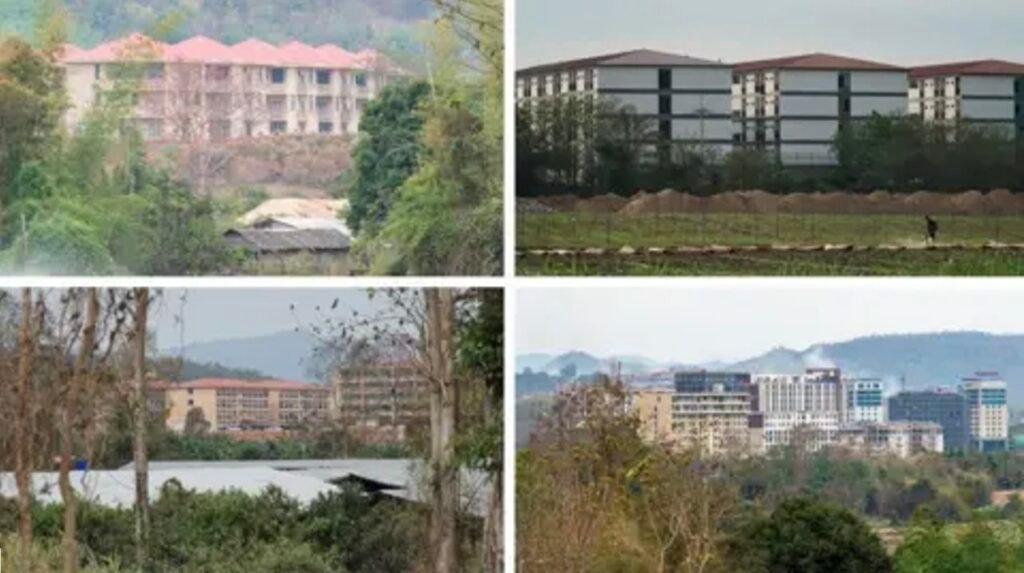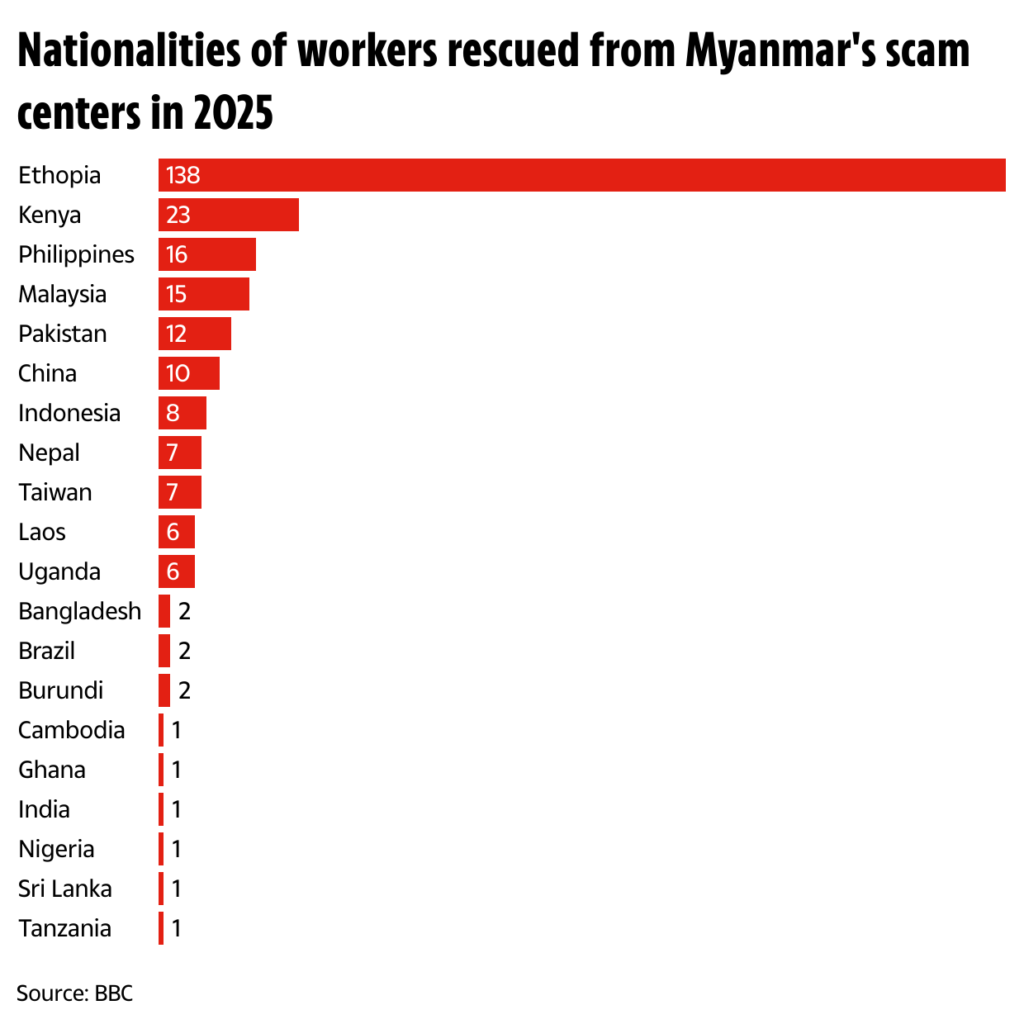Asia has become a global epicentre for scam call centres, which are increasingly being established to carry out fraudulent schemes and human trafficking. These operations cost billions of dollars annually and are causing untold personal tragedies. In this article Asia Thinkers explores the rise of scam call centres in Asia, their global expansion and connections to organised crime and their alarming ties to human trafficking.

Victims of scam centres who were tricked or trafficked into working in Myanmar, stuck in limbo at a compound. Credit: Reuters
Call centre operations have been located in Southeast Asia for several years, particularly in border areas of Cambodia, Laos and Myanmar, as well as the Philippines. Many of these are centres of organised crime, involving human trafficking and fraudulent scams. Operations are run by organised crime groups functioning as “scam hubs” and trap workers in conditions akin to modern-day slavery. These hubs solicit billions of dollars from victims through romantic deception, bogus investments and illegal gambling schemes. According to recent UN reports, scam hubs are spreading their operations across the globe in response to huge profits and the increasing crackdowns by authorities in Asia. These operations are now found as far away as Africa, Latin America and the Pacific.
Fraud Factories: The Rise of Criminal Call Centre
Call centres have long been a thriving industry in Asia, particularly in India and the Philippines. While legitimate businesses have flourished due to low labour costs and a large English-speaking workforce, criminal enterprises have also sprung up. These illicit operations masquerade as legitimate employers, luring workers with promises of high-paying jobs, only to trap them in forced labour schemes. Recent investigations have revealed multiple scam factories in Southeast Asia, particularly in Cambodia near the Chinese border and along the border between Thailand and Myanmar. These operations have turned the region into a major centre for scam hubs, further encouraged by the military takeover in Myanmar. In response to the recent crackdown by Thai authorities, many scam call centres along the Thai-Myanmar border have been shut down, resulting in the release of thousands of trafficked workers. However, these efforts have also led to the relocation of some criminal operations to countries outside Asia.

The methodology employed by scammers frequently involves calling unsuspecting individuals, often from wealthier countries, and coercing them into giving up personal information, transferring funds or providing access to sensitive financial data. In terms of the number of victims, the most common scams in Asia in 2022 were phishing, job scams and e-commerce fraud. The scams that caused the highest financial losses were those involving investment fraud, employment and government official impersonations. Victims have come from North America, Europe, and Australia, while the trafficked workers operating these scams often come from regions suffering from economic hardship, conflict or instability, including South and Southeast Asia, China, parts of Africa and Eastern Europe. Recruits are typically lured by advertisements promising high-paying roles abroad, often in online gambling casinos. These ads are typically found on social media or through recruitment services
Survivors who have escaped these centres describe a harrowing picture of forced labour. Thousands of workers are held in guarded compounds, stripped of their passports and coerced into working up to 16-hour shifts, under the threat of violence. Many of them are forced to scam people worldwide, with little to no chance of escape. A recent report by the United States Institute of Peace estimates that more than 300,000 scammers are located in Myanmar, Cambodia and Laos and are responsible for stealing at least $40 billion globally.
The Human Trafficking Crisis.
One of the most alarming aspects is the increasing connection to human trafficking. Criminal organisations easily recruit or abduct individuals and transport them across borders to work in these labour-intensive scam centres. Reports indicate that individuals, often students or workers, are lured by promises of money, work or education opportunities – in some cases they are kidnapped outright. Once trapped in these facilities, victims endure physical abuse, threats to their families, starvation and psychological coercion. Victims who manage to escape or are rescued, are often treated as illegal migrants or accomplices, instead of trafficking victims. As a result, they are frequently detained or deported without proper investigation, which allows criminal networks to operate with impunity.

The Global Spread of Scam Centres
UN investigations reveal that criminal scam centres have expanded operations into Africa, South Asia, the Middle East and select Pacific islands, with money laundering and people trafficking becoming integral parts of their operations. While their recruitment efforts have extended globally – including Europe, North America and South America – this expansion is primarily a response to intensified crackdowns in Asia.
Until recently, law enforcement in Asia had largely ignored the criminal activities of scam centres, due to the difficulty of addressing the international nature of these crimes. These operations often span multiple countries, with recruiters, operators and financial beneficiaries spread across different regions. For example, a fraudulent call centre in Cambodia targeting victims in Europe, might be run by a Chinese crime syndicate and staffed with trafficked workers from India. This complexity creates jurisdictional gaps that hinder investigations and delay coordinated actions.
Recently, due to immense financial losses and public pressure, governments in the region have begun cracking down on these illicit networks. Raids on illegal call centres in Myanmar, Laos and the Philippines, have led to arrests and rescue operations. However, these efforts remain reactive and sporadic. In Africa, Nigeria has become a hotspot for scam operations. Police raids in late 2024 and early 2025 resulted in numerous arrests, including suspects from East and Southeast Asia who were involved in cryptocurrency and romance scams. Zambia and Angola have also dismantled Asian-linked cyber fraud operations. In Latin America, Brazil is facing a growing set of challenges related to cyber-enabled fraud, online gambling and money laundering, with some linkages to Southeast Asian criminal groups. In late 2023, more than 40 Malaysians were rescued in Peru after being trafficked by a Taiwan-based gang, the Red Dragon syndicate, which forced them to commit cyber-enabled fraud.
Without stronger international collaboration, consistent enforcement and global coordination, these efforts will have little impact on the broader criminal networks that are expanding globally.
International Collaboration.
Global law enforcement agencies have long advocated for a multipronged approach to human trafficking and scams. Governments are being urged to treat forced labour in scam operations as a severe form of human trafficking and enact stronger laws to prosecute perpetrators while protecting victims. Enhanced border controls and intelligence-sharing across nations are key to intercepting traffickers and identifying fake recruitment schemes, similar to how global law enforcement combats international drug cartels.
In Asia, Singapore has been at the forefront of efforts to combat scams. In 2022, Singapore established an Anti-Scam Command to coordinate resources quickly, trace incoming scam proceeds, and freeze scammers’ bank accounts. Scam cases in Singapore reached a record high in 2023, with 46,563 cases reported, up 46.8% from the previous year. Victims lost a total of $651.8 million in 2023, slightly down from $660.7 million in 2022. Other countries like Malaysia, Hong Kong, Australia, and Canada have also set up dedicated units to fight scams, acting as direct points of contact for law enforcement to alert one another when scam proceeds flow into their countries.
Public Awareness.
It is estimated that nearly half of global consumers encounter scam attempts as often as once a week. Despite increased media coverage and awareness campaigns, there remains a lack of coordinated global public education on scams, with significant regional disparities in scam awareness. Public awareness campaigns are essential in informing the global population about the risks of overseas job offers, which could prevent people from falling prey to deceitful recruiters. Similarly, potential scam victims in wealthier nations must be educated to recognise fraudulent calls and report suspicious activities. International organisations, tech companies and financial institutions must collaborate to disrupt the funding and communication networks that enable scam call centres. Tracing money trails, shutting down digital infrastructure used for scams, and holding platforms accountable for enabling human trafficking are critical steps forward. Many countries are taking the lead with media campaigns to keep the public informed but alarming new technologies like online markets, money laundering networks, stolen data products, malware, artificial intelligence and deepfake technologies are paving the way for increasingly sophisticated fraudulent schemes. A proactive, coordinated effort from governments and law enforcement is essential.
The exploitation of call centres for human trafficking and scams is a byproduct of the modern social and business environment, where technology supports every aspect of our lives. As our reliance on digital tools grows, so too does the opportunity for criminal exploitation. What was once seen as an economic opportunity has now become a front for abuse and exploitation. As these crime hubs evolve – especially with the rise of artificial intelligence -governments must adapt and develop programs to fight scammers. International coordination is necessary to provide a global response and prevent the ongoing victimisation of the thousands of people with ruined lives, trapped in modern-day slavery or subjected to extortion.
Disclaimer: The opinions expressed in this article are solely those of the writer. The author assumes no responsibility or liability for any errors or omissions in the content of this article. The information contained in this article is provided on an “as is” basis with no guarantees of completeness, accuracy, usefulness or timeliness.

